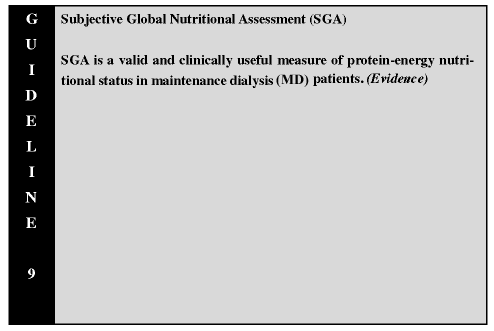
1. Evaluation of Protein-Energy Nutritional Status

Subjective global assessment (SGA) is a reproducible and useful instrument for assessing the nutritional status of MD patients.16,29,70-72 It is a simple technique that is based on subjective and objective aspects of the medical history and physical examination. SGA was initially developed to determine the nutritional status of patients undergoing gastrointestinal surgery73,74 and subsequently was applied to other populations.16,29,70-72,74-77
Among the benefits of using the SGA are that it is inexpensive, can be performed rapidly, requires only brief training, and gives a global score or summation of protein-energy nutritional status. Disadvantages to the SGA include the fact that visceral protein levels are not included in the assessment. SGA is focused on nutrient intake and body composition. It is subjective, and its sensitivity, precision, and reproducibility over time have not been extensively studied in MHD patients.
Many cross-sectional studies have used the SGA to assess nutritional status in individuals undergoing CPD.16,29,71,75,78 Correlations among SGA and other measures of protein-energy nutritional status are well described.29,71 SGA has been less well studied in MHD patients.72 In the Canada-USA (CANUSA) study, a prospective cohort study of 680 continuous ambulatory peritoneal dialysis (CAPD) patients, SGA was modified to four items (weight loss, anorexia, subcutaneous fat, and muscle mass). Subjective weightings were assigned to each of the four items representing nutritional status (eg, 1 to 2 represented severe malnutrition; 3 to 5, moderate to mild malnutrition; and 6 to 7, normal nutrition).16
It is recommended that SGA be determined by the 4-item, 7-point scale used in the CANUSA Study,16 because this method may provide greater sensitivity when assessing nutritional status and more predictive power in MD patients than the original 3-point ordinal scale.73,74 The CANUSA study, using the 7-point scale, showed with multivariable analysis that a higher SGA score was associated with a lower relative risk of death and fewer hospitalized days per year.16 Also, small changes in the SGA score correlated with clinical outcomes.79 Methods for performing SGA are discussed in Appendix VI.